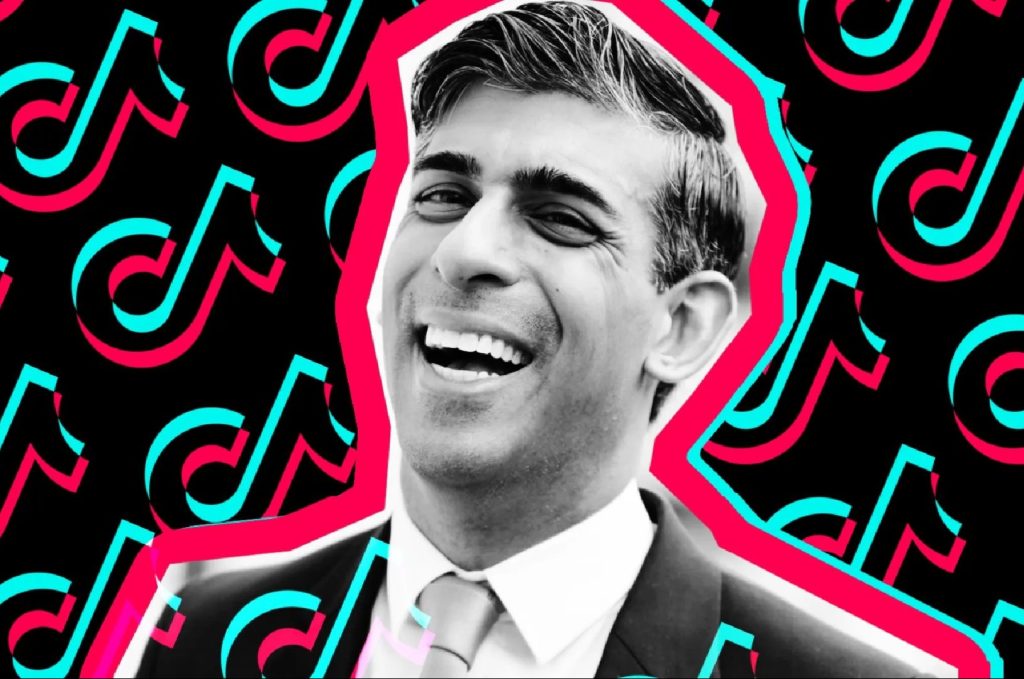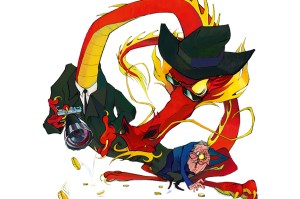“Sorry to be breaking into your usual politics-free feed,” chirrups British prime minister Rishi Sunak in his first-ever TikTok video. He is awkward, understandably. TikTok is enemy territory for the Tories. What most users learn about the Conservatives is usually damning, from left and right.
“I think the Tory Party deserves to die,” says Jess Gill, who with 1.2 million “likes” has a larger TikTok following than the party she wants dead. “They’ve betrayed Britain. On all fronts but particularly immigration. We have an extremist immigration policy that is ruining this country.” She is from Bolton in the northwest and commutes from Reading to King’s College London on the two days she has to go in to study. Her videos denounce those who “simp for” (or “defer to”) the Tories.
The old adage is you win elections by seizing the center ground. That’s not how you win TikTok
Such videos rarely last as long as a minute, but Ofcom says TikTok is now a far greater news provider than any newspaper. At the last British general election, TikTok didn’t even appear in surveys about news sources. Now almost a third of young people use the platform to get news, as do 10 percent of Britons. It’s designed to be addictive and it succeeds. For its users, TikTok has replaced television. Surveys suggest that the average young user watches its videos for about an hour a day.
The Tories and Labour have long hesitated to join but now both parties have TikTok accounts. Sunak struggles with the medium and the message. His debut fifty-second video was about his plans to conscript teenagers, claiming that they could “choose” the military. That isn’t true. They can apply but it’s the military that will pick the most able 5 percent. Most will end up doing community service — which TikTokers have been quick to point out. Over the next few weeks, the prime minister will have to work out how to sell his other youth policies, such as forcing teenagers to study math until eighteen.
Labour’s response was a Shrek meme that accused Sunak of throwing children into the army meat-grinder. The party seems to have captured the anarchic tone of the app a little better (it has recently hired a TikTok advisor). Abroad, several popular politicians can credit the platform for their rise, from the French right-winger Jordan Bardella to Argentina’s Javier Milei. Upstart parties are making liberal use of TikTok in next week’s European Parliament elections.
There’s a price to not being on it too. Olaf Scholz, the sixty-five-year-old German chancellor, was recently chastised by an activist in Dresden for his party having no TikTok presence. The far-right AfD’s account, meanwhile, has 420,000 followers. The TikTok generation, he was told, is becoming the AfD generation. Nigel Farage and Reform have been using the app for months: Farage has a personal following of almost 600,000.
But TikTok users listen to their peers more than politicians — and official parties tend to struggle with this. In Australia’s recent referendum on a constitutional “voice” for Aboriginals, videos from Fair Australia (an unofficial No campaign) had 20 million plays overall, compared with about a million on the two official pro-voice accounts.
Both Labour and the Tories are understood to be on the hunt for political influencers or “spinfluencers.” But those who are politically active on TikTok say Starmer isn’t left-wing enough and Sunak isn’t right-wing enough. The old adage is that you win elections by seizing the center ground. That’s not how you win TikTok.
Take Harry, a twenty-three-year-old from Leicester who runs the account @thechampagne_socialist. His videos have been liked 14 million times. He voted for Keir Starmer to be Labour leader but became disillusioned after Starmer refused to back the striking doctors and train drivers. “That was a real turning point,” he says. As you might expect, he’s no fan of Sunak either. “Look at the demonizing of the disabled, the idea that there’s a ‘sick-note culture.’ Bro, that’s not a thing. We’re having to spend £69 billion a year on health and sickness disabilities because we’ve had austerity for fourteen years and they’ve gutted living standards.”
Chris Kunzler is another left-wing influencer, whose videos have been liked 13 million times. He tends to post about the war in Gaza and thinks that Labour has disgraced itself on the issue. “There’s been a complete failure to offer opposition on anything,” he says. Would he respond to an approach from Labour HQ? “Absolutely not. I couldn’t say yes to their current policy on Israel and a lot of other social issues such as trans rights. On that, they’re the same as the Tories; on austerity, exactly the same as the Tories.” He says he would have been “much more happy to work with a Jeremy Corbyn-led Labour.”
The app might cause the two leaders trouble in other ways. A spoof clip of the prime minister’s voice — AI-generated — declaring that he could not care less “about energy bills being over £3,000” has been viewed hundreds of thousands of times.
Only one conservative party has cracked TikTok: the New Zealand National Party, which triumphed last fall. Its videos were viewed ten times more than those of the country’s Labour Party, and mostly by the young. Sean Topham, the party’s TikTok guru, now runs an agency that claims to have “swung more elections than Russia.” He says the lesson is simple: “TikTok is the main online battleground these days. Good videos can reach millions very quickly and it’s extremely effective. Politicians need to embrace the different styles, trends, aesthetics of TikTok. It’s not like Facebook at all.”
There won’t be time, in this campaign, for any Westminster party to master TikTok. Given that polls show those under twenty-five supporting Labour over the Tories by a ratio of six to one, the TikTok generation may be lost to Sunak. But if Starmer gets into power, he may find TikTok no more welcoming to his government than it has been to the Tories. Sunak and Starmer want the influencers — but the influencers don’t really want them.
This article was originally published in The Spectator’s UK magazine. Subscribe to the World edition here.


























Leave a Reply